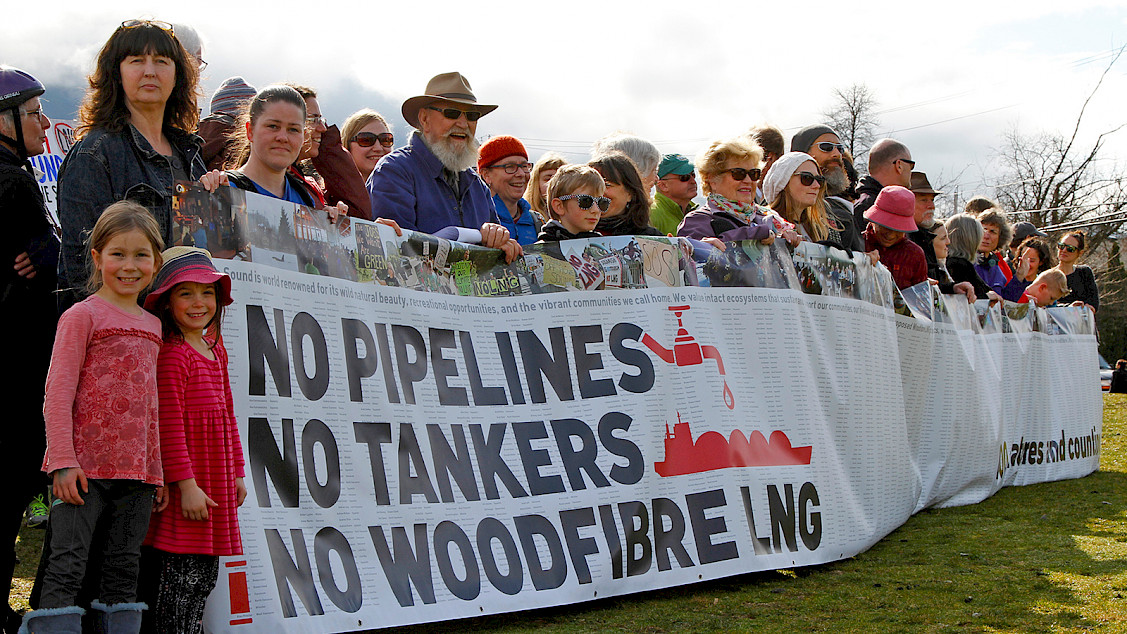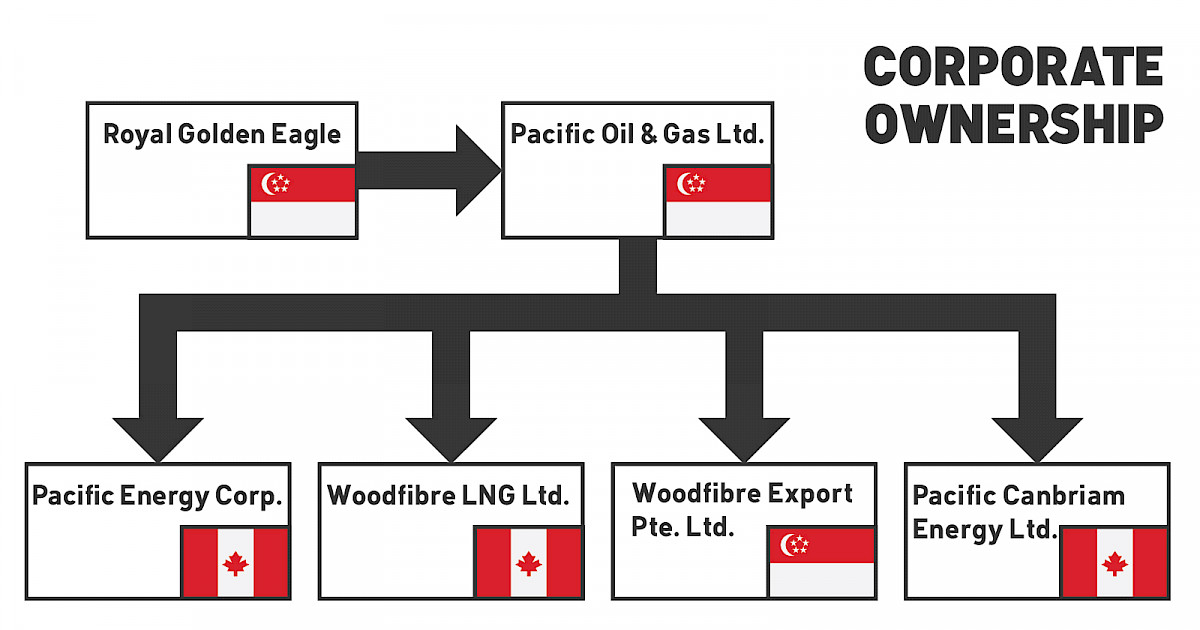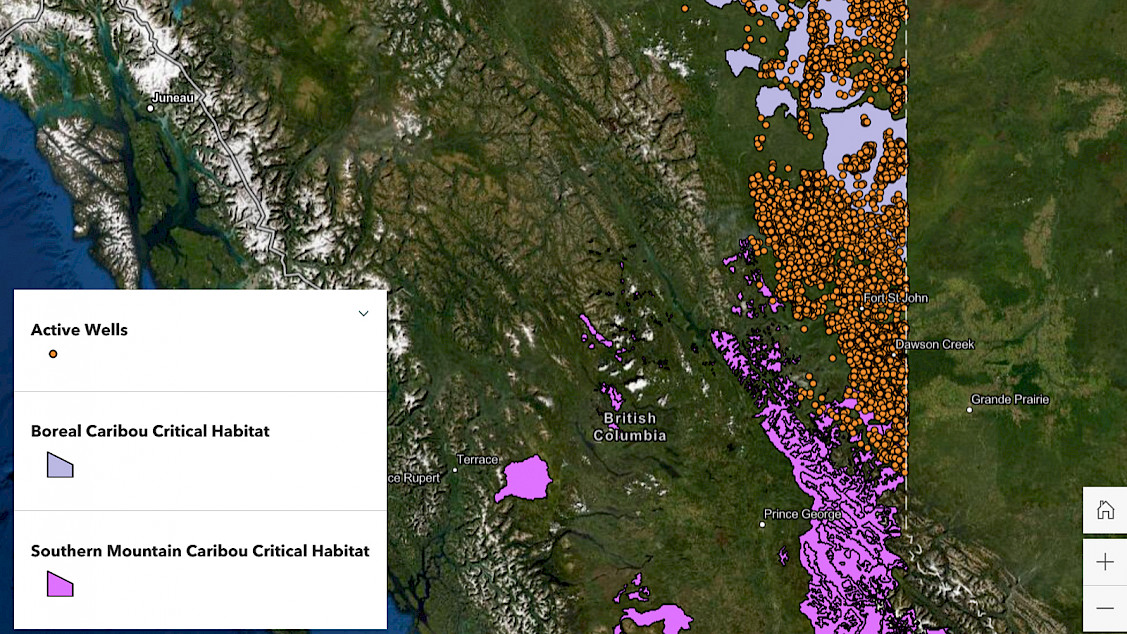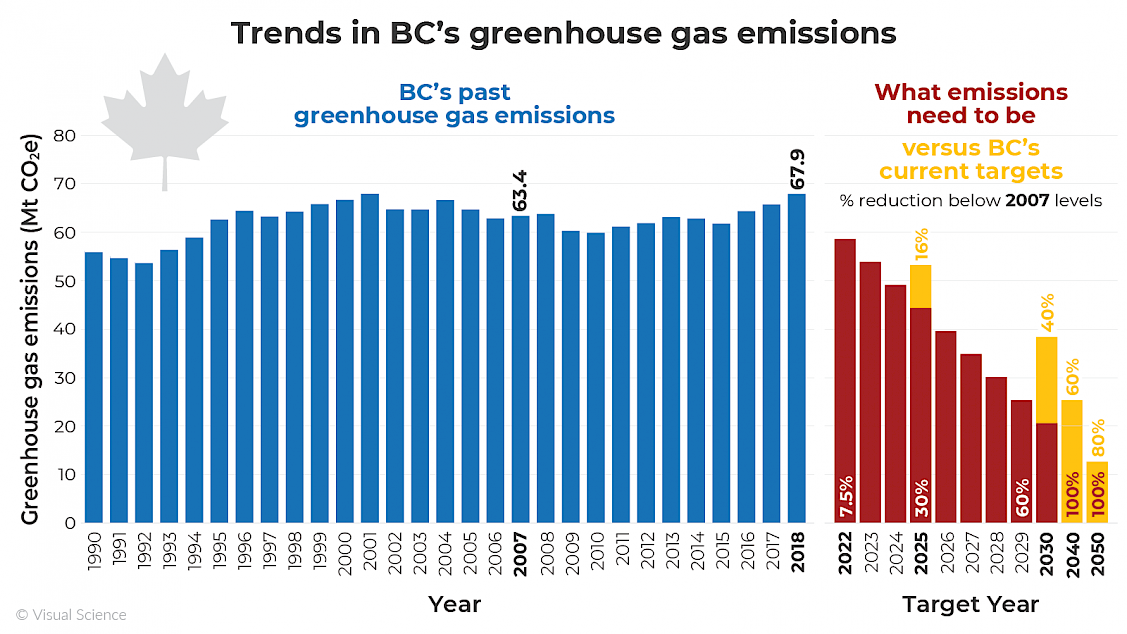Open letter: Why BC's LNG is not ethical
March 26, 2022
Tracey Saxby

To: Members of the Legislative Assembly
For the last eight years, I have been one of thousands of citizens standing in opposition to the proposed Woodfibre LNG and FortisBC pipeline projects near Squamish BC.
I am also a marine scientist, and work professionally with governments, universities, and organizations worldwide as a Visual Science Communication consultant.
This coming Monday, the BC Liberals have brought forward a motion to be debated: "Be it resolved that this House support B.C.’s transitional, ethical LNG industry to meet the needs of British Columbians and the world."
I call on you to reject this motion as LNG is neither transitional nor ethical. Here are a few key reasons why:
1. Corruption, lies, and scandals
-
Woodfibre LNG is owned by the notorious Indonesian businessman, Sukanto Tanoto, whose companies have a history of tax evasion and profit shifting, human rights violations, and animal rights violations.
-
The corporate ownership is structured so that Woodfibre LNG may never declare a profit in Canada—instead, profits could flow offshore to Singapore and/or offshore tax havens.
-
Woodfibre LNG intended to begin construction in 2015, however the project has been plagued by high staff turnover and ongoing corruption, such as illegal donations made by Woodfibre LNG staff.
-
Woodfibre LNG made a fake Final Investment Decision (FID) in November 2016, two days prior to the BC Liberal convention—just two weeks after Sukanto Tanoto and Rich Coleman signed secret documents that the government still refuses to release. This brings into question the reliability of Woodfibre LNG’s public statements, and whether future FID announcements are to be considered reliable or genuine.

Corporate ownership of Woodfibre LNG allows for possible profit shifting and tax evasion.
2. LNG exports will increase fracking, trample Indigenous Rights, and drive caribou extinction
- According to the Canada Energy Regulator, natural gas production in B.C. is projected to nearly double by 2040 due to LNG exports, primarily for LNG Canada.
- The expansion of fracking in northeast B.C. has been linked to habitat fragmentation and declining caribou populations. See the UBC study.
- Last year, the B.C. Supreme Court ruled that the B.C. government breached the Treaty rights of Blueberry River First Nations by permitting forestry, oil and gas, hydro, and mining development. “The evidence shows that the province has not only been remiss in addressing cumulative effects and the impacts of development on treaty rights, but that it has been actively encouraging the aggressive development of the Blueberry Claim Area through specific royalty programs (including for marginal wells) and Jobs Plan policies.
- While the B.C. government has committed to revise the BC Royalty framework, it is uncertain if new fossil fuel subsidies will be introduced to prop up LNG exports, which are not economically viable without massive government handouts. We have calculated that Woodfibre LNG alone will receive over $50 million per year in Federal and Provincial tax breaks, subsidies, and incentives.

3. LNG is a climate disaster
-
To limit temperature rise to 1.5° Celsius (C), British Columbia needs to decrease fossil fuel production and consumption by roughly 7.5% every year between now and 2030 (see graph).
-
B.C. is not on track to achieve its current climate targets. Developing an LNG export industry further threatens B.C.’s ability to meet these climate targets. Increasing oil and gas production for LNG exports by Woodfibre LNG, Kitimat LNG, and LNG Canada alone will result in 22.6 megatonnes (Mt) of greenhouse gas emissions in 2050; B.C.'s current climate target for 2050 is 80% below 2007 levels, or 12.7 Mt of emissions. But B.C.'s climate targets are not aligned with the latest science that calls for net zero emissions by 2050 or sooner.
-
Committed emissions from existing energy infrastructure already jeopardize the 1.5°C climate target. This means that we cannot build new fossil fuel infrastructure including LNG export facilities.
-
Life-cycle emissions from B.C. LNG are worse than coal. Methane emissions from fossil fuel extraction are 25–40% higher than previously estimated and B.C. is underreporting fugitive methane emissions.
-
LNG exports will likely increase global greenhouse gas emissions
“…exporting LNG is likely to increase global greenhouse gas emissions. While uncertainty remains, methane leakage, additional energy demand, and decreased domestic coal displacement have the very real potential to undermine any prospective climate benefit in the long term... Future LNG export facilities could become today's coal plants, where entrenched interests fight meaningful action to reduce climate emissions, with significant negative impacts on the global public.” -
Last year, Quebec rejected GNL Québec, as "the province was not convinced the LNG plant would lower greenhouse gas emissions."
-
In 2019, more than 11,258 scientists declared a climate emergency, calling to replace fossil fuels with low-carbon renewables, leave fossil fuels in the ground, support poorer nations in transitioning away from fossil fuels, eliminate subsidies, and steadily escalate carbon pricing.
-
The Intergovernmental Panel on Climate Change (IPCC) Working Group I report released in August 2021 was described as a ‘code red’ for humanity. The report found that the production of oil, coal, and gas is the primary cause of the climate crisis, with fossil fuels responsible for 85% of CO2-equivalent emissions in the last decade.
-
The IPCC's Working Group II report released in February 2022 warned that "climate change is a threat to human wellbeing and the health of the planet. Any further delay in concerted global action will miss a brief and rapidly closing window to secure a liveable future.” The report called for "rapid, deep cuts in greenhouse gas emissions."
-
The International Energy Agency has called on world governments to immediately stop investments in and approvals of new oil and gas projects.
-
Another recent report urged all nations to begin a rapid phaseout of fossil fuel production, calling on Canada as a wealthy, high-emitting nation to end all oil and gas production by 2034 to ensure that warming does not exceed 1.5°C.

In conclusion:
LNG is still a fossil fuel that will increase fracking and lock in climate pollution for decades. The narrative that we can burn more fossil fuels to solve climate change is a lie.
While oil and gas companies and political parties are opportunistically pointing to the Russia-Ukraine War as an excuse to increase fracking and LNG exports, this crisis instead highlights the extreme price volatility of oil and gas, as well as the vulnerability of fossil fuel infrastructure to targeted attacks. It will take at least 5 years before any new LNG export projects are up and running in B.C. In the meantime, the European Commission plans to rapidly scale up renewables and energy efficiency measures, divesting from gas to ensure future energy security.
The climate crisis is already impacting our communities and our health: deadly heat waves, wildfires, drought, floods, crop failure, fisheries collapse, and costly evacuations and infrastructure damage. The catastrophic events we experienced in 2021 killed lives and destroyed entire communities and critical infrastructure.
"The social and economic benefits of accelerating clean energy transitions are huge, and the costs of inaction are immense."
— Fatih Birol, IEA Executive Director (see quote)
"Starting today, every action, every decision matters. Worldwide action is more urgent than previously assessed."
— IPCC Working Group II (see presentation)
I call on you to reject this motion as LNG is neither transitional nor ethical.
My Sea to Sky is one of more than 350+ diverse organizations and businesses that have signed an open letter calling on the B.C. government to confront the climate emergency and undertake ten urgent climate actions. We reiterate our support for this letter, and urge you to implement these ten actions.
I would be pleased to share the wealth of research that we have compiled over the last eight years. Please feel free to contact me if you have any questions, or would like to learn more.
Sincerely,
Tracey Saxby, BA/BSc (Hons I)
Partner at Visual Science
Executive Director of My Sea to Sky
Phone: (604) 892-7501
Email: tracey@myseatosky.org